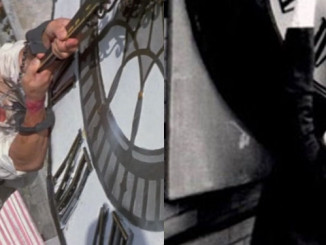A rare dramatic work from Charlie Chaplin, Buster Keaton hitting his stride and Cecil B DeMille’s first version of The Ten Commandments are just a few of the films that will see their copyright lapse and enter into the public domain at the stroke of midnight New Year’s Eve.
Thanks to copyright law, any work that was published in 1923 – be it literature, music or film – will become part of the public domain as their copyright expires. Due to previous legislation that extended copyright protection, this will be the first time in two decades where works will enter the public domain. The reason for such a long gap in work entering the Public Domain resides with a law passed in 1998 that extended the copyright on pre-1978 work from 75 years to 95 years. It was a bill championed in part by Disney, who had the first Mickey Mouse cartoon, 1928’s “Steamboat Willie,” set to enter public domain just a few years in the future, in 2024.
Film-wise, 1923 was still four years away from the sound revolution, but silent films were hitting a creative stride hitherto unseen in the burgeoning art form. Charlie Chaplin’s A Woman Of Paris starring Edna Purviance and Adolphe Menjou was somewhat of an oddity from the comic actor/director. A rare drama, Chaplin chose to just remain behind the camera, perhaps as a way to not distract audiences who would except Little Tramp-esque antics if he were to appear on screen. Not to worry, though, as Chaplin’s other 1923 film, the comedy The Pilgrim, which features him front and center on screen, will also be entering the Public Domain.
This was the year Buster Keaton released Our Hospitality, which many have called the comic’s first great film. Harold Lloyd, meanwhile, released Safety Last with its iconic scene of the comic hanging off the side of a clock on the outside of a tall building while traffic rushes by below. Another comedy, Potash And Perlmutter, is an adaptation of Montague Glass’s ethnic Jewish comic novel and stage play of the same name, featuring Alexander Carr and Barney Bernard reprising their Broadway roles as the two title characters. Canine star Rin Tin Tin had his first starring role in this year’s Where The North Begins. The film proved such a box office success it purported saved Warner Brothers from an impending bankruptcy.
And there are a number of films of lesser historical note going into the public domain as well. Silent comic Ben Turpin’s The Shiek Of Araby is one of cinema’s earliest self-parodies, spoofing the Rudolph Valentino 1921 cultural juggernaut The Shiek. Little Old New York is a drama produced by newspaper magnate William Randolph Hurst’s Cosmopolitan Productions for his mistress actress Marion Davies to star in.
Non-film works becoming public domain include Robert Frost’s immortal poem “Stopping By The Woods On A Snowy Evening,” Charles L Dodgson’s Alice’s Adventures In Wonderland and Alice Through The Looking-Glass. Over a thousand songs, including the novelty tune “Yes, We Have No Bananas,” will now be available for modern artists to reinterpret to their hearts content, free of copyright worries.
Now granted, just because a work like Burroughs’s Tarzan And The Golden Lion is about to go into the public domain, that does not necessarily mean that you can go out and make a new Tarzan film scott free. The folks at Edgar Rice Burroughs, Inc still own the trademark on the character of Tarzan itself, and you would still need permission to use that mark. (And the folks at Edgar Rice Burroughs, Inc have been rather aggressive about defending that trademark.) But not all works going into the public domain have that trademark loophole limiting their use.
What this does mean is that these works are now open to be used in a variety of ways by academics and artists without seeking permissions. If a budding documentarian wanted to make a film exploring early Hollywood Biblical adaptations, they wouldn’t need to ask permission, or spend money, to use DeMille’s 1923 version of The Ten Commandments. A musician who wanted to use a clip from Lloyd’s Safety Last in a music video can just go ahead and do so. And anyone who wanted to make a video essay comparing 1921’s The Sheik with TUrpin’s 1923 spoof version, now has free reign to use both films in their project.
Copyright expiration is an important part of the life cycle of culture. It was intended by the Founding Fathers to move a work from benefiting just its creators and their heirs to benefiting a new generation of artists and academics. And what is even more important about this cycle of expiration is that this is the first time works will go into Public Domain in the internet-era. There are many forgotten works that online resources like The Guttenberg Project, Google Books or the Internet Archives will be able to make available to everyone free of charge as the new year begins in a way that material wasn’t available the last time that things entered into Public Domain. How will scholars and those who create online use this new material? Who can say, but it should be interesting to find out.





